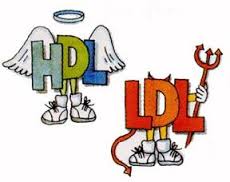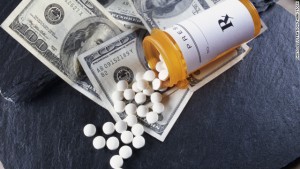
Maybe, Maybe Not.
Low LDL – “bad” – cholesterol may be causing Alzheimer’s, may actually increase heart risk, and may increase cancer. For years the lipid hypothesis: “fat causes heart disease” has been a medical mantra. Time for a revision?
For the last several decades, cholesterol has been divided into two categories: “good” or HDL cholesterol, and “bad” or LDL cholesterol. But we have LDL for a reason. Unless interfered with by some drug, the body will maintain it at a certain level. LDL cholesterol is essential for cell replacement and renewal. Deficiencies of this can therefore cause problems. So, in some ways, LDL cholesterol is also “good.”
However, LDL cholesterol comes in different sizes. A more modern view is that the small sized species is dangerous and the large is not. The size is determined largely by triglycerides (circulating fat). If triglycerides are high, the body makes small, dangerous cholesterol particles. If low, it is predominately the large, safer variety.
Triglycerides are circulating fat. A ha, you say! It must be fat, right? Here again it’s not what you would think. Triglycerides are high NOT because you ate too much fat. They are high because you ate too much of a certain food that inhibits fat metabolism. And that food is starches and sugars. And this includes fructose, whole grain stuff, alcohol, etc. Starch turns to sugar in the intestine, so whole grain or not, it’s all sugar as far as the body is concerned. Human bodies view sugar as a windfall and literally force the cells to use sugar and ignore fat. Cells prefer fat. They run cleaner and more efficiently.
Why is this? Hummingbirds live on a 90% sugar diet, do not get heart disease, and live 20 years or more. With some sort of genetic rearrangement, we could too. Might take a few hundred thousand years though. The likely problem is that we already spent several hundred thousand years as hunter-gatherers, and most of what we could hunt and gather was NOT sugar or starch, especially Northern hunter-gatherers. Sugar might show up in fruit. That would be gobbled down, and, at least in temperate climes, that fruit shows up late in summer, so a genetically savvy hunter-gatherer would store all that sugar as fat and thus be able to survive the harsh ice-age winters. But we digress.
Lately, almost heretical articles have appeared espousing the benefits of LDL-cholesterol. Some even make elaborate apologies. Here are summaries of the top ones.
Low LDL-Cholesterol May Be Associated With Alzheimer’s
This one is quite a surprise. One might immediately jump to the conclusion that cholesterol lowering drugs are causing the Alzheimer’s epidemic. This may well turn out to be the case, but we are not there yet. It’s association, not causation. People with Alzheimer’s happen to tend to have low cholesterol. See the paper here.
This research was unexpected, as there had been numerous papers indicating that high LDL cholesterol was also problematic. Some other researchers, though, went about measuring cholesterol levels in patients and found that the more severe the Alzheimer’s, the lower the LDL cholesterol.
But why might low cholesterol be associated with Alzheimer’s. This isn’t really known, but cholesterol is involved in both the creation and removal of the ß-amyloid that is the hallmark of Alzheimer’s. ß–amyloid is normally present in the brain, and its function isn’t known. Alzheimer’s seems to be characterized by some breakdown of this function. The APOE-4 lipoprotein is also involved in this.
Could both papers be right? Of course. It would mean there is an optimum level. But what that optimum level is, nobody knows. However, your body knows, or probably does. Anyway I’d put more chips on that than a statin-wielding physician.
High-LDL Cholesterol May Be Associated wit less Heart Disease

A Toxic Mix
Pure heresy, this one. LDL has been the bad guy for 40 years, and there is a billion dollar statin industry that says it is going to stay the bad guy. But there it is. (Actual paper here.) Now while this one may seem crazy, the results, published in the British Medical Journal, specifically say this: “The cholesterol hypothesis predicts that LDL-C will be associated with increased all-cause and CV (cardio-vascular) mortality. Our review has shown either a lack of an association or an inverse association between LDL-C and both all-cause and CV mortality.”
How good is this research? We thought it was very good, the researchers knew they were backing into a buzz-saw with this one and were very careful and thorough. Most cardiologists would reject it without even reading it. Not only was an inverse relationship between LDL-cholesterol and all-cause mortality found, and inverse relationship was also found between LDL-cholesterol and heart disease itself. Now, this is association. But so is the lipid hypothesis.
High LDL-Cholesterol May Be Protective Against Cancer
This one really isn’t much of a surprise. Many experiments that lowered LDL cholesterol and did nothing else seemed to increase cancer, and this is perfectly logical: cholesterol is a cell wall building material. Meddle with the level and cells are weakened. Weak cells=more cancer.
So What Can Be Concluded Here?
Your body knows best. Otherwise it would not be tightly regulating cholesterol. There is scant evidence that lowering cholesterol is a good idea. However, there can be exceptions
So What About Statins
Oddly, after decades on the market, how statins work is not really known. For a long time, it was assumed that the effect was from lowering cholesterol. Then a couple of things happened. First a series of studies that showed that if you hadn’t already had a heart attack, statins offered little, if any, protection. If you haven’t had a heart attack, it is called primary protection. It is being given so you won’t have that first heart attack. If you have already had a heart attack, then statin therapy is called secondary protection—so you won’t have second one. Somewhat confusing terminology.
The other event that happened was that lowering LDL in other ways, notably ezetimibe, actually increased mortality. This would seem to indicate that it is the other properties of statins that are providing the benefit. They have a couple of other properties. First, they act like NSAID (i.e. aspirin) and second, they suppress the immune system.
But statin may have a place, though not the place their manufacturers would prefer. Here are three cases where statins could provide benefit
- Secondary Protection. This was the original statin market. Primary prevention is “outreach.” For those with prior heart attacks, statins are not profoundly helpful, but a modest benefit will be held desirable in this frightening situation.
- Genetic Familial Hypoalphalipoproteinemia. This is a case of low HDL, the “good” cholesterol. Statins could be beneficial here too.
- Some forms of familial hypercholesterolemia (ultra high cholesterol) and a strong family pattern of heart disease. The cholesterol number itself may not be the issue, with the family history being the more important factor. Many people have no problem with cholesterol levels as high as 400.
Concerning statins for primary protection, TheNNT.com had this to say, “The effectiveness of the statins appears to be reproducible across studies in this group—they do lower cholesterol in most people who took them. But very few people will avoid a heart attack or stroke by virtue of this change. It takes 5 years of daily statin therapy to achieve a 1.6% chance of avoiding a heart attack, and a 0.37% chance of avoiding a stroke. Most disappointing, statins seem unable to prevent death in this group. And most concerning, the drugs may increase diabetes, a serious and life-altering disease.” Most disappointing indeed. There are a lot of references there.
Concerning secondary protect (prior heart attack), per the same site, statin therapy saved 1 in 83. Thin, but probably worth it. Or maybe not, read on…
Exercise and Healthy Lifestyle Is the Best Primary and Secondary Protection
We’ll close with a brief sermon.
Statins are so well entrenched and promoted that the controversy will probably rage for years. However, the benefit in any case is slight if it is there at all. For primary prevention, 250 must take the drug for one to be spared a heart attack, however, of those 250, 20 will get serious muscle pain, and there may be an increase in cancer, and appears to be a 50% in incidence of adult onset diabetes, and finally, no improvement in all-cause mortality.
But, of course, if appropriate exercise and lifestyle are used, the reduction in risk is more than 50%, in most cases a lot more. And it works for everyone, not just one in 250 or 1 in 83.
Thanks to you, I finally have the “ammunition” to advocate on my behalf vs. statin-happy docs. I have high total cholesterol, which immediately triggers a well-intentioned “best practices” onslaught from docs and insurers — but I’m healthy, active, and the various ratios are all nominal. I even insisted on getting VAP lipid profile to confirm that my LDL was the small-particle type. My GP surrendered…
Cool, Dan. It would be great to think your doc will be more thoughtful for the rest of his patient base now that you have shown him a different perspective. Well done, Dr. Mike
Is it acceptable to abruptly stop taking statins?
Hi Jim, I don’t know of any well done study that convincingly answers this question. Festina lente would be my advice, Dr. Mike
Dr. Nichols, some have indicated that more so than particle size and / or particle count, that oxidation of LDL is the key issue. If I’m reading these articles correctly (which is questionable sometimes), an increase in oxidized LDL (either by ingestion of too much oxidized man-altered vegetable oils – canola etc…, or by genetic issue with reduced clearing of LDL), the oxidized LDL is essentially caustic to the arterial endothelial cells. This in turn deteriorates the cells and starts an inflammation process and plaque development / progression. Thoughts?
True, Jim; note that smaller particles are more prone to oxidative damage. You wind up with a ‘twofer.’ Plaque induction and progression is not the result of a single factor. Sunlight, independent of Vitamin D levels, induces immune response to oxidation. Sunlight? Yes, even sunlight is a variable in the complex equation of cause. Thank you for the feedback, Dr. Mike
Truly complex indeed. Probably why there’s no magic pill.
Another issue with statins is that the side effects seem to be very serious and potentially permanent for many people. And how many people are actually harmed is apparently not well known given the inaccuracies in the reporting system, other than “way more than reported in the official studies”. It would be interesting to hear your experience with your patient population.
As you will have guessed, I don’t prescribe many statins so this list of complaints is from less than 50 patients: “my muscles ache all of the time,” “I can’t sleep,” “I’m tired all of the time,” “my joints hurt,” “I have less strength when I exercise.” All of their A1c’s drifted up when they were on the statins. Sad list, Dr. Mike